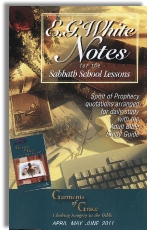|
||||||||||||||
Commentary on "From Exalted to Cast Down"
Day 5: Wednesday, April 6, 2011 - Wanting to Be God
Overview
This lesson focusses on the idea that Lucifer's fall resulted from wanting to be God. The author builds his case, again, from Ezekiel 28 and also from Isaiah 14. He makes the point that the "mountain of God" in Ezekiel 28:14 is a figure of speech used to represent heaven or the placement of God's government, and he shows examples where mountains were the venues for great spiritual experiences. The "stones of fire" the author says represent the presence of God.
The author then uses Isaiah 14:12-14 to show that Lucifer's downfall was wanting to be like God. He ends with questions about how we, the readers, have wanted to be like God, and what the only cure for this deception is.
Observations
Once again, this lesson has deduced conclusions from Scripture that are unwarranted. The "mount of God" in Ezekiel 28:14 and Isaiah 14:13 is not referring to heaven or to God's government. In context, these phrases most likely refer to Mount Zaphon, also known as Mount Casius, which was located in Syria. The Canaanites considered this place to the be home or the meeting place of the gods.
The Ezekiel passage, as we've previously noted, is a lament for the king of Tyre; the Isaiah passage, similar in its descriptions, is a prophecy about the king of Babylon. In both cases the prophets were foreshadowing the imminent destruction of these two kings who had arrogantly established themselves as god-like personages. The king of Babylon considered himself to be a deity.
Again, as in the case of Ezekiel's description, the Isaiah description of the king of Babylon can possibly be seen secondarily as a description of Lucifer's arrogance, but these are by no means the primary meaning of the passages. Ellen White's great controversy theme required an antagonist who could be pitted against Jesus the protagonist, and Lucifer was the prefect character. Her emphasis on him is astounding given the fact that she claimed to be a Christian and that Adventism is considered a Christian denomination.
In reality, Lucifer is a background player whose influence we must acknowledge but whom we have no need to fear if we are in Christ.
According to Ellen White, however, Satan and Jesus continue as opponents until Jesus finally "wins" because of the faithful obedience of the few Sabbath-keepers who have been faithful to the end, whereupon Jesus will place the guilt for their sins on Satan who will be punished for them.
Lucifer's wanting to be God is not a point of instruction for us. We are commanded to believe in the Lord Jesus. We are commanded to leave behind all that entangles us, even our religious pursuit of righteousness, and embrace Jesus alone. We are never, under any circumstances, to look to Lucifer or to shape our lives around avoiding Satan. We are to see him as doomed, a spirit over whom we have Christ's authority when we are born of the Spirit.
Analyzing the ways we might want to be God is pointless. All our natural thoughts are evil continually; there is none who seeks God (Rom. 3:11).
Our only hope is submission to the Lord Jesus and placing our faith in His shed blood for our salvation. Only when we have believed in Him are we transferred out of the domain of darkness into the kingdom of His beloved Son (Col 1:13).
I challenge the reader to stop studying Lucifer and to look to Jesus, the Author and Finisher of our faith. I challenge you to place your faith in the One who died to pay for your sin. He alone is worthy of study, or honor, and of praise.
Summary
- The "mountain of God" is not heaven but refers in context to Mt. Zaphon, the home or meeting place of the Canaanite gods.
- Isaiah 14 is not a passage about Lucifer, unless secondarily it has some application. Primarily, however, it refers to the king of Babylon who is about to be cast down.
- It is pointless to analyze how we might want to "be God". At any rate, all our natural thoughts are evil.
- Our only hope is in submitting to the Lord Jesus and placing our faith in Him and His shed blood which paid for our sin.
- Stop studying Lucifer and instead get to know the Lord Jesus. He is all we ever need.
Copyright 2011 BibleStudiesForAdventists.com. All rights reserved. Revised March 30, 2011. This website is published by Life Assurance Ministries, Glendale, Arizona, USA, the publisher of Proclamation! Magazine. Contact email: BibleStudiesForAdventists@gmail.com.
The Sabbath School Bible Study Guide and the corresponding E.G. White Notes are published by Pacific Press Publishing Association, which is owned and operated by the Seventh-day Adventist church. The current quarter's editions are pictured above.
Official Adventist Resources
Standard Edition Study Guide Week 2
Teacher's Edition Study Guide Week 2
Easy Reading Edition Study Guide Wk 2
Search the Complete Published Ellen G. White Writings
Please Support This Project


